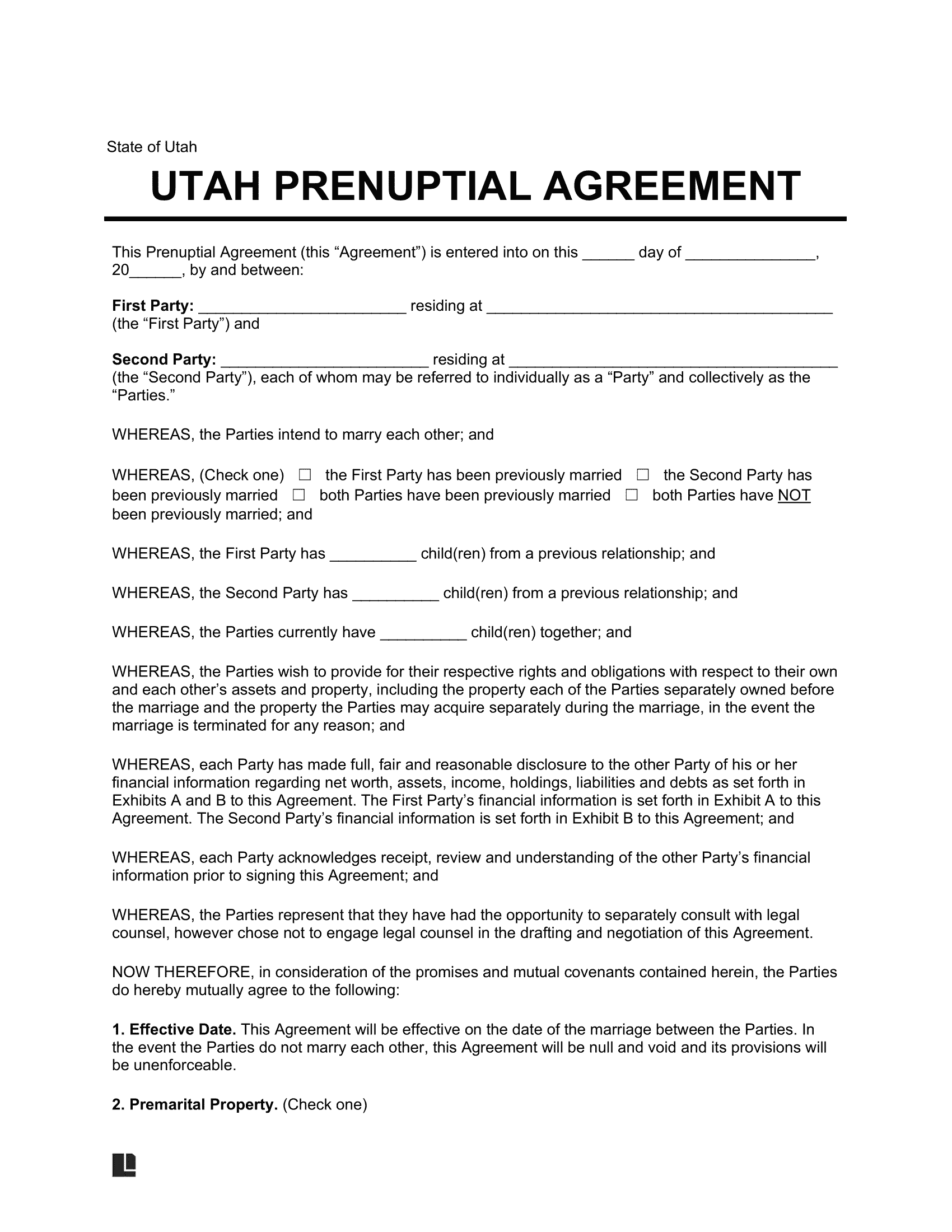A Utah prenuptial agreement serves as a legal framework that specifies how spouses will divide properties and assets if their marriage ends. Such agreements not only facilitate a smooth transition during the divorce process but also establish specific stipulations if one spouse unexpectedly passes away.
This contract addresses various aspects, including the management of real estate, entitlements to alimony, and the terms relating to insurance benefits. Please note that spouses can’t use this agreement to discuss custody matters for existing or future children or reject potential child support obligations.
Legal Considerations
Laws:
- § 30-8-1 – Title
- § 30-8-2 – Definitions
- § 30-8-3 – Writing — Signature Required
- § 30-8-4 – Content
- § 30-8-5 – Effect of Marriage — Amendment — Revocation
- § 30-8-6 – Enforcement
- § 30-8-7 – Enforcement — Void Marriage
- § 30-8-8 – Limitation of Actions
- § 30-8-9 – Application and Construction
Signing Requirements: Both partners must sign the document (§ 30-8-3).
Dividing Property: Equitable division (§ 30-3-5).
Enforceability Requirements
In Writing and Signed
A prenuptial agreement must be in written form and include both parties’ signatures. This requirement emphasizes the importance of documentation and mutual agreement. This document doesn’t depend on consideration, meaning the parties don’t have to partake in an exchange of something of value for the agreement to be valid.
Contain Appropriate Content
The agreement can cover various aspects relating to the rights and obligations of spouses concerning property and spousal support. Specifically, it can dictate terms regarding:
- The management, control, and disposition of property.
- The modification or elimination of spousal support.
A prenup should not include matters that violate public policy or criminal statutes. Furthermore, it can’t affect a child’s right to support or other related benefits, ensuring parents meet their children’s needs regardless of the agreement’s terms.
Voluntary Execution and Fair Disclosure
For a prenup to be enforceable, both parties must enter into it voluntarily without any fraud, deceit, or coercion at the time of execution. Before signing, both parties must have a reasonable disclosure of each other’s property and financial obligations. Alternatively, they can expressly waive the right to such disclosure and have adequate knowledge of each other’s finances.
Courts reference state law and refer to case law to determine outcomes. For example, Matter of Estate of Beesley, 883 P.2d 1343 (1994) covers voluntary versus involuntary agreements, while Keyes v. Keyes, 351 P.3d 90 (Utah App. 2015) details the importance of disclosing your financial situation.
Protection Against Inequitable Outcomes
State law protects against inequitable outcomes for both partners. For example, if enforcing a prenup would lead to one party becoming eligible for public assistance, a court may require the other party to provide sufficient support to prevent this situation. Furthermore, if a marriage is void, a document that would’ve otherwise been classified as a prenup can still be enforceable to avoid unfair results.
Amendment and Revocation Post-Marriage
After marriage, the spouses can make amendments or revoke the agreement if they document the changes in writing and both sign the agreement. Like the original agreement, these changes are enforceable without consideration, letting spouses adjust their agreement as their circumstances evolve.
